We hope you are well. St. George’s Day, celebrated annually on April 23rd, commemorates the death of England’s patron saint, and its history is rooted in both religious tradition and national identity. The legend tells of St. George slaying a dragon that was terrorizing a town and saving a princess. It’s a Christian story, with St. George offering to kill the dragon only if the town converted to Christianity. The dragon is often seen as a symbol of evil or a force to be overcome. The veneration of George spread from Syria Palaestina through Lebanon to the rest of the Byzantine Empire. By the 5th century, the veneration of George had reached the Christian Western Roman Empire.
The St George’s Cross, a red cross on a white background, became associated with the Crusades when it was adopted by English knights during the 12th and 13th centuries, symbolising their participation in Christian military campaigns to the Holy Land under the banner of Saint George, who was revered as a warrior saint. Over time, it became the national flag of England and, through England’s expansion, a symbol of British power. As the British Empire grew, the St George’s Cross appeared on colonial flags and military uniforms, linking it with British colonialism and imperial dominance, and embedding it in the visual identity of empire.
For the West, the symbol represents courage, national pride and English/British values of ‘democracy’, ‘the rule of law’, ‘individual liberty’, ‘respect’ and ‘tolerance’. However, for many non-white British citizens and people from the countries that were invaded and colonised by Britain, the symbol represents brutal British occupation and colonisation of their lands as well as oppression. The English Far-Right have also adopted the St George’s Cross as a symbol of White Pride and nationalism, anti-immigration and anti-multiculturalism.
It is integral to know English history and its relationship with its racism towards non-white people as the events of the past helped shape the modern conflicts of today. Scroll down to see our announcements and book recommendations regarding racism in the UK.
 Unpacking Islamophobia: Roots, Impact and Countermeasures
Unpacking Islamophobia: Roots, Impact and Countermeasures
Register for this workshop, led by Arzu Merali, to critically examine Islamophobia as a structural and systemic tool of imperialism and colonialism.
WHEN: Saturday, 26 April, 2025, 2pm – 4pm BST
WHERE: IHRC Bookshop (202 Preston Road, Wembley, HA9 8PA)
Registration: complete this form to register
About the workshop host:
Arzu Merali has been working in the field of human rights as an author, writer, researcher and consultant for more than twenty five years. She also teaches modules on human rights, feminism and Islamic discourse.
She has worked on projects with small and medium sized NGOS, as well as in partnerships between civil society and academia spanning Europe, Asia and North America. This includes working on state of the art research projects on Islamophobia, racism, feminism, equality, decoloniality, human rights / grammars of human dignity, and political theory. She has worked as a manager, researcher and consultant on such projects, developing analyses and recommendations for policy makers, media and civil society.
She also works as an editor both in the field of human rights, as well as poetry, children’s literature and fiction.
Her website is a home for different aspects of her work, including her blog, podcasts, articles, reports and details of her books.
She is one of the founders (in 1997) of Islamic Human Rights Commission and was their Head of Research. She was formerly the editor-in-chief of Palestine Internationalist, and is currently editor of The Long View. She is on the board of Amrit publishers, and a part of the Decolonial International Network Foundation. She teaches at the annual Critical Muslim Studies Summer School in Granada, Spain. She has helped curate exhibitions and events on issues of social justice, genocide, racism and Islamophobia, and miscarriages of justice.
Yemen is one of the world’s worst humanitarian crisis. The war has driven more than 4.5 million people from their homes and 21.6 million are in dire need of humanitarian assistance and protection services. 2022 alone saw 234,000 new displacements. Yemen remains among the top six largest internal displacements in the world.
IHRC Trust has been sending lifesaving humanitarian aid to Yemen. Through your support, essential assistance to families and orphans has reached areas where the delivery of aid has been challenging due to the ongoing conflict., making it very risky for aid convoys to reach their destinations. Beneficiaries have thanked IHRC Trust for their support as without it many would be completely destitute. To donate, click below.
THROWBACK: Report Launch: ‘Environment of Hate: The New Normal for Muslims in the UK’
On 17th November 2015 at the P21 Gallery, IHRC launched its second UK-wide study, ‘Environment of Hate: The New Normal for Muslims in the UK‘. It is an indispensable work which draws on rigorous survey findings and academic studies to address the candid realities of Muslims in Britain based on thoughts and experiences, the normalisation of Islamophobic rhetoric and increasing anti-Muslim hate crime. Click below to watch the recording of the event.
Speakers at this event include: Arzu Merali – Researcher in decoloniality and human rights, one of the founders of IHRC and co-author of the report; Nisha Kapoor – A lecturer in Sociology at the University of York; Peter Oborne – The former chief political commentator of The Telegraph; Abed Choudhury – Head of the IHRC advocacy project within the UK; David Miller – a Professor of Sociology in the Department of Social & Policy Sciences at the University of Bath.
Other publications by IHRC regarding Islamophobia in the UK include:
BMEG (British Muslims’ Expectations of the Government) series co-written by Dr Saied Ameli and Arzu Merali.
Countering Islamophobic Narratives in the United Kingdom by Arzu Merali
Getting the Message: The Recurrence of Hate Crimes in the UK by Dr Saied Ameli, Ebrahim Ahooei, Ehsan Shaghasemi and Arzu Merali
The Rise of Citizenship Deprivation: A Global Threat to Human Rights by Caterina Aiena
The Authoritarian Drift of the European Democratic State: the Crackdown on Pro-Palestine Movements by Caterina Aiena
Below are books that are currently available at IHRC Bookshop:
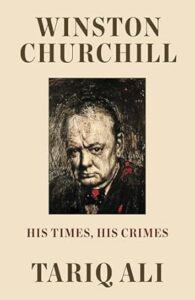 Winston Churchill: His Times, His Crimes – Tariq Ali
Winston Churchill: His Times, His Crimes – Tariq Ali
The life and crimes of the last, great Imperialist. The subject of numerous biographies and history books, Winston Churchill has been repeatedly voted as one of the greatest of Englishmen. Even today, Boris Johnson in his failing attempts to be magisterial, has adopted many of his hero’s mannerism! And, as Tariq Ali agrees, Churchill was undoubtedly right in 1940-41 to refuse to capitulate to fascism. However, he was also one of the staunchest defenders of empire and of Britain’s imperial doctrine.
In this coruscating biography, Tariq Ali challenges Churchill’s vaulted record. Throughout his long career as journalist, adventurer, MP, military leader, statesman, and historian, nationalist self belief influenced Churchill’s every step, with catastrophic effects. As a young man he rode into battle in South Africa, Sudan and India in order to maintain the Imperial order. As a minister during the first World War, he was responsible for a series of calamitous errors that cost thousands of lives.
His attempt to crush the Irish nationalists left scars that have not yet healed. Despite his record as a defender of his homeland during the Second World War, he was willing to sacrifice more distant domains. Singapore fell due to his hubris. Over 3 Millions Bengalis starved in 1943 as a consequence of his policies. As a peace time leader, even as the Empire was starting to crumble, Churchill never questioned his imperial philosophy as he became one of the architects of the postwar world we live in today.
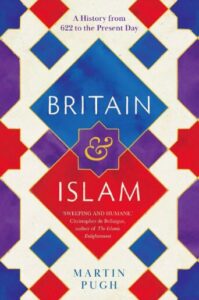 Britain and Islam: The History from 622 to the Present Day – Martin Pugh
Britain and Islam: The History from 622 to the Present Day – Martin Pugh
An eye-opening history of Britain and the Islamic world-a thousand-year relationship that is closer, deeper, and more mutually beneficial than is often recognized.
In this broad yet sympathetic survey-ranging from the Crusades to the modern day-Martin Pugh explores the social, political, and cultural encounters between Britain and Islam.
He looks, for instance, at how reactions against the Crusades led to Anglo-Muslim collaboration under the Tudors, at how Britain posed as defender of Islam in the Victorian period, and at her role in rearranging the Muslim world after 1918.
Pugh argues that, contrary to current assumptions, Islamic groups have often embraced Western ideas, including modernization and liberal democracy. He shows how the difficulties and Islamophobia that Muslims have experienced in Britain since the 1970s are largely caused by an acute crisis in British national identity. In truth, Muslims have become increasingly key participants in mainstream British society-in culture, sport, politics, and the economy.
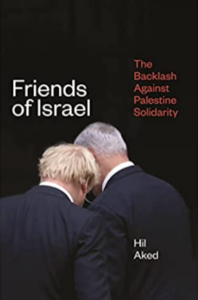 Friends of Israel: The Backlash Against Palestine Solidarity – Hill Aked
Friends of Israel: The Backlash Against Palestine Solidarity – Hill Aked
Friends of Israel provides a forensically researched account of the activities of Israel’s advocates in Britain, showing how they contribute to maintaining Israeli apartheid. The book traces the history and changing fortunes of key actors within the British Zionist movement in the context of the Israeli government’s contemporary efforts to repress a rising tide of solidarity with Palestinians expressed through the Boycott Divestment and Sanctions (BDS) movement.
Offering a nuanced and politically relevant account of pro-Israel actors’ strategies, tactics, and varying levels of success in key arenas of society, it draws parallels with the similar anti-boycott campaign waged by supporters of the erstwhile apartheid regime in South Africa.
By demystifying the actors involved in the Zionist movement, the book provides an anti-racist analysis of the pro-Israel lobby which robustly rebuffs anti-Semitic conspiracies. Sensitively and accessibly written, it emphasises the complicity of British actors – both those in government and in civil society. Drawing on a range of sources including interviews with leading pro-Israel activists and Palestinian rights activists, documents obtained through Freedom of Information requests and archival material, Friends of Israel is a much-needed contribution to Israel/Palestine-related scholarship and a useful resource for the Palestine solidarity movement.
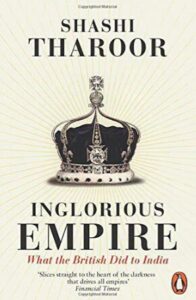 Inglorious Empire: What The British Did To India – Shashi Tharoor
Inglorious Empire: What The British Did To India – Shashi Tharoor
In the eighteenth century, India’s share of the world economy was as large as Europe’s. By 1947, after two centuries of British rule, it had decreased six-fold. Beyond conquest and deception, the Empire blew rebels from cannon, massacred unarmed protesters, entrenched institutionalised racism, and caused millions to die from starvation.
British imperialism justified itself as enlightened despotism for the benefit of the governed.
But Shashi Tharoor takes on and demolishes this position, demonstrating how every supposed imperial ‘gift’ from the railways to the rule of law was designed in Britain’s interests alone. He goes on to show how Britain’s Industrial Revolution was founded on India’s de-industrialisation, and the destruction of its textile industry. In this bold and incisive reassessment of colonialism, Tharoor exposes to devastating effect the inglorious reality of Britain’s stained Indian legacy.
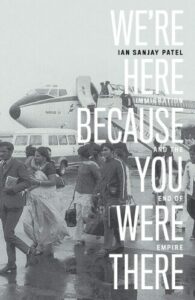 We’re Here Because You Were There: Immigration and the End of Empire – Ian Sanjay Patel
We’re Here Because You Were There: Immigration and the End of Empire – Ian Sanjay Patel
Drawing on new archival material from the Foreign and Commonwealth Office, Ian Sanjay Patel retells Britain’s recent history in an often shocking account of state racism that still resonates today. In a series of post-war immigration laws, Britain’s colonial and Commonwealth citizens from the Caribbean, Asia and Africa were renamed immigrants. In the late 1960s, British officials drew upon an imperial vision of the world to contain what it saw as a vast immigration crisis involving British citizens, passing legislation to block their entry.
As a result, British citizenship itself was redefined along racial lines, fatally compromising the Commonwealth and exposing the limits of Britain’s influence in world politics. Combining voices of so-called immigrants trying to make a home in Britain and the politicians, diplomats and commentators who were rethinking the nation, Ian Sanjay Patel excavates the reasons why Britain failed to create a post-imperial national identity.
The reactions of the British state to post-war immigration reflected the shift in world politics from empires to decolonization. Despite a new international recognition of racial equality, Britain’s colonial and Commonwealth citizens were subject to a new regime of immigration control based on race. From the Windrush generation who came to Britain from the Caribbean to the South Asians who were forced to migrate from East Africa, Britain was caught between attempting both to restrict the rights of its non-white colonial and Commonwealth citizens and redefine its imperial role in the world. Despite Britain’s desire to join Europe, which eventually occurred in 1973, its post-imperial moment never arrived, subject to endless deferral and reinvention.
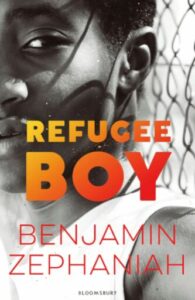 Refugee Boy – Benjamin Zephaniah
Refugee Boy – Benjamin Zephaniah
Alem is on holiday with his father for a few days in London. He has never been out of Ethiopia before and is very excited. They have a great few days together until one morning when Alem wakes up to find that his father has left him. Alem is left a letter in which his father admits that political problems in Ethiopia mean they have decided he will be safer in London. Alem is now on his own, in the hands of the social services and the Refugee Council. This story charts Alem’s fate as he is moved from children’s home to foster family, and in and out of court hearings.
Informed by his own experience with the UK’s Prevent programme while teaching in a Muslim community, Rob Faure Walker explores the linguistic emergence of ‘extremism’ in political discourse and the potentially damaging generative effect of this language. Taking a new approach which combines critical discourse analysis with critical realism, this book shows how the fear of being labelled as an ‘extremist’ has resulted in counter-terrorism strategies which actually undermine moderating mechanisms in a democracy.
Analysing the generative mechanisms by which the language of counter-extremism might actually promote violence, Faure Walker explains how understanding the potentially oppressive properties of language can help us transcend them. The result is an imminent critique of the most pernicious aspects of the global War on Terror, those that are embedded in our everyday language and political discourse.
Drawing on the author’s own successful lobbying activities against counter-extremism, this book presents a model for how discourse analysis and critical realism can and should engage with the political and how this will affect meaningful change.
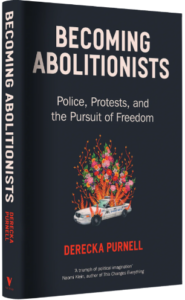 Becoming Abolitionists: Police, Protests, and the Pursuit of Freedom – Derecka Purnell
Becoming Abolitionists: Police, Protests, and the Pursuit of Freedom – Derecka Purnell
In the aftermath of the murder of George Floyd and the resurgence of Black Lives Matter the call for the abolition of the police became a central demand for the movement. In this extraordinary, revelatory memoir, Derecka Purnell recounts her own path towards abolitionism. Her story starts in St. Louis, where she was often unhoused and experienced food insecurity, and where calling 911 was often the only option in a crisis.
She describes her political awakening and activism through watching the aftermaths of events including Hurricane Katrina, the murder of Trayvon Martin and the uprising in her hometown of Ferguson following the death of Michael Brown. Through Harvard Law School she comes to see that that solution can be found not just in the debate on better policing but the end of the policing itself. Through her own story she makes a powerful, passionate argument for rethinking a fair, equal society where there is no place for state violence and racial repression.
Purnell confronts the history of police as a means to capture runaway slaves and uphold white supremacy, to the over-policing and murder of Black people in today’s cities. She argues that the police are doing exactly what they were created to do and, in response, imagines new systems that work to address the root causes of violence instead. A revolutionary book about the hope for freedom, Becoming Abolitionists will inspire readers to imagine and create new communities that can guarantee safety, equality, and real justice for all.
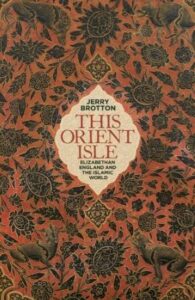 This Orient Isle: Elizabethan England and the Islamic World – Jerry Brotton
This Orient Isle: Elizabethan England and the Islamic World – Jerry Brotton
In 1570, when it became clear she would never be gathered into the Catholic fold, Elizabeth I was excommunicated by the Pope. On the principle that ‘my enemy’s enemy is my friend’, this marked the beginning of an extraordinary English alignment with the Muslim powers who were fighting Catholic Spain in the Mediterranean, and of cultural, economic and political exchanges with the Islamic world of a depth not again experienced until the modern age.
England signed treaties with the Ottoman Porte, received ambassadors from the kings of Morocco and shipped munitions to Marrakesh. By the late 1580s hundreds, perhaps thousands, of Elizabethan merchants, diplomats, sailors, artisans and privateers were plying their trade from Morocco to Persia.
These included the resourceful mercer Anthony Jenkinson who met both Süleyman the Magnificent and the Persian Shah Tahmasp in the 1560s, William Harborne, the Norfolk merchant who became the first English ambassador to the Ottoman court in 1582 and the adventurer Sir Anthony Sherley, who spent much of 1600 at the court of Shah Abbas the Great. The previous year, remarkably, Elizabeth sent the Lancastrian blacksmith Thomas Dallam to the Ottoman capital to play his clockwork organ in front of Sultan Mehmed. The awareness of Islam which these Englishmen brought home found its way into many of the great cultural productions of the day, including most famously Marlowe’s Tamburlaine, and Shakespeare’s Titus Andronicusand The Merchant of Venice. The year after Dallam’s expedition the Moroccan ambassador, Abd al-Wahid bin Mohammed al-Annuri, spent six months in London with his entourage. Shakespeare wrote Othello six months later.
This Orient Isle shows that England’s relations with the Muslim world were far more extensive, and often more amicable, than we have appreciated, and that their influence was felt across the political, commercial and domestic landscape of Elizabethan England. It is a startlingly unfamiliar picture of part of our national and international history.
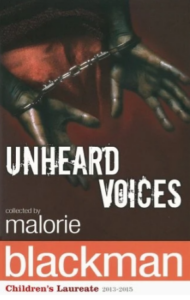 Unheard Voices – Malorie Blackman
Unheard Voices – Malorie Blackman
In March 1807, the British Parliament passed an Act making the trading and transportation of slaves illegal. It was many years before slavery, as it was known then, was abolished, and slavery still continues today in different ways, but it was a big step forward towards the empancipation of a people.
Malorie Blackman has drawn together some of the finest of today’s writers and poets to contribute to this important anthology. Including work by Benjamin Zephaniah, Alex Haley, Olaudah Equiano as well as a foreword and story by Malorie Blackman herself. Their short stories and poems sit alongside first-hand accounts of slavery from freed slaves, making a fascinating and absorbing collection that remembers and commemorates one of the most brutal and long-lasting inflictions of misery that human beings have inflicted upon other human beings.

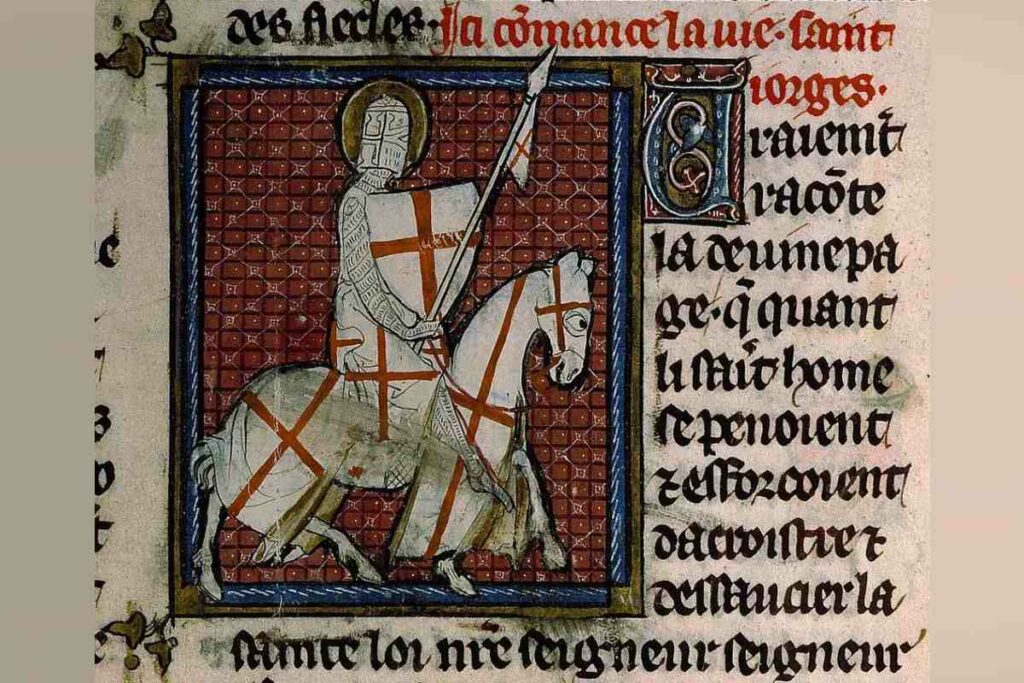

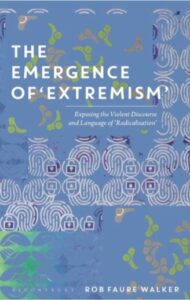 The Emergence of ‘Extremism’: Exposing the Violent Discourse and Language of ‘Radicalisation’ – Rob Faure Walker
The Emergence of ‘Extremism’: Exposing the Violent Discourse and Language of ‘Radicalisation’ – Rob Faure Walker




